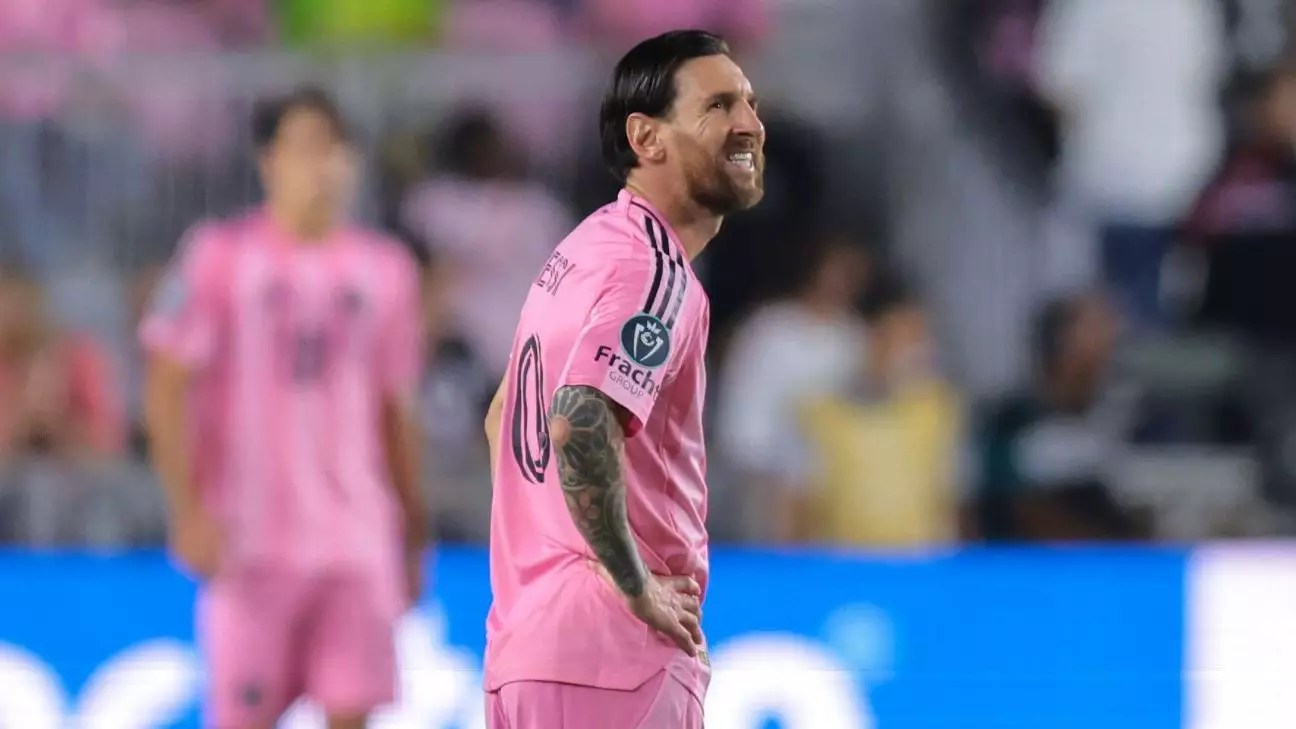As the sun began to set over Fort Lauderdale, Chase Stadium pulsed with anticipation, drawing fervent fans into its vibrant embrace. The stands were a sea of pink as the supporters of Inter Miami CF arrived en masse, their chants reverberating through the air like a unifying anthem of hope and determination. However, within minutes of commencing their match against the Vancouver Whitecaps, that optimism would dissipate into the night, replaced by a bleak silence as the scoreboard flashed a disheartening MIA: 1, VAN: 3. This loss would not just mark an elimination but would echo a sentiment shared by a star-studded roster that has yet to rise to the expectations laid upon them since the celebrated arrival of Lionel Messi and his fellow Barcelona alumni.
Sport, much like life, is filled with unpredictable twists and turns, but for Inter Miami, the narrative has spun a familiar tale of potential eclipsed by reality. The collective heart of the stadium felt like it was dismissed when the final whistle blew. As Messi and his teammates exited, their hurried retreat to the locker rooms illustrated resignation, a stark contrast to the exuberance the fans had hoped would ignite an unforgettable evening. The bitter truth is that for all the promises of success made by the club’s ownership and coaching staff, the trophy cabinet remains dishearteningly sparse.
From Promise to Pressure: The Burden of Expectations
From the moment co-owner Jorge Mas declared that the acquisition of top-tier talents was the key to success, expectations soared to dizzying heights. The team initially dazzled in the inaugural Leagues Cup, marking a promising beginning. Yet, as the seasons shifted, the sobering reality set in—the harsh glaring need for consistency became paramount. In this context, Messi and his companions—such as Luis Suárez, Sergio Busquets, and Jordi Alba—were expected to not just influence games but to lead a transformative renaissance for the franchise. The question arose: why do these illustrious names not translate their illustrious careers into tangible success for Inter Miami?
The 2023 season has left many grappling with this dilemma. While Mascherano was hailed as the ideal figurehead to inspire a winning mentality, there’s an unmistakable understanding that stellar players do not automatically guarantee successful outcomes on the pitch. Each game seemed to bring with it the same crushing weight of unrealized potential, leaving supporters in a perpetual state of emotional limbo. When the match against the Vancouver Whitecaps unfolded, the fervor faded not due to a lack of talent on the field, but perhaps due to the inability to transform individual brilliance into cohesive team success.
Patterns of Futility: A Rinse and Repeat Cycle
If history has taught us anything, it’s that sports are riddled with cyclical narratives. For Inter Miami, the patterns of disappointment have become painfully predictable. The underwhelming exit from the Champions Cup mirrors the previous year’s early playoff flames snuffed out by CF Monterrey. In both instances, the squad entered the matches with aspirations of victory, only to be met with failures that echoed past regret. The inability to maintain composure in critical moments reshapes the conversation around the team’s direction.
Despite promising starts, the team’s execution faltered. Once again, defensive miscalculations turned potential victories into agonizing losses. In the high-stakes business of football, it’s the moments leading up to critical errors that often define a team’s fate. Inter Miami’s persistent failure to avoid such defensive blunders raises lingering questions about their preparedness and strategic approach against high-caliber opponents like Vancouver.
Moreover, the coaching decisions made in the heat of battle have increasingly come under scrutiny. Mascherano’s attempts to adapt to game situations often feel too reactionary rather than proactive, as evidenced when desperation swept through the ranks following devastating goals scored against them. In these pivotal moments, tactical composure has waned, replaced by anxieties that tend to fester during critical matches, further compounding the existing pressure on players and coaches alike.
The Future is Now: A Race Against Time
As the clock continues its relentless march forward, Inter Miami finds itself at a crossroads; with each passing season, the urgency for silverware grows exponentially. The careers of its golden generation—Messi, Suárez, Alba, and Busquets—are finite, and their expiration dates are fast approaching. Though these legends have achieved monumental success globally, their legacy with Inter Miami stands at risk of being defined by the voids in the trophy cabinet rather than the successful pursuits they imagined.
While there remain opportunities in the current season to claim a trophy—be it through MLS, the Leagues Cup, or the Club World Cup—it’s clear that the club must evolve from this pattern of near-misses and setbacks. For every ounce of hope expressed by veterans like Busquets who implore that the team will rise again, a cold realization takes hold: the title of “almost there” is one better left unclaimed.
Questions of strategy, coaching philosophy, and mental resilience must be addressed if they wish to avoid another chapter of disappointment. As the 2023 season marches onward, the real challenge for Inter Miami will be overcoming the haunting shadow of the past, finding a way to connect their impressive roster with results that matter, and translating that potential into lasting glory before it’s too late.


Leave a Reply